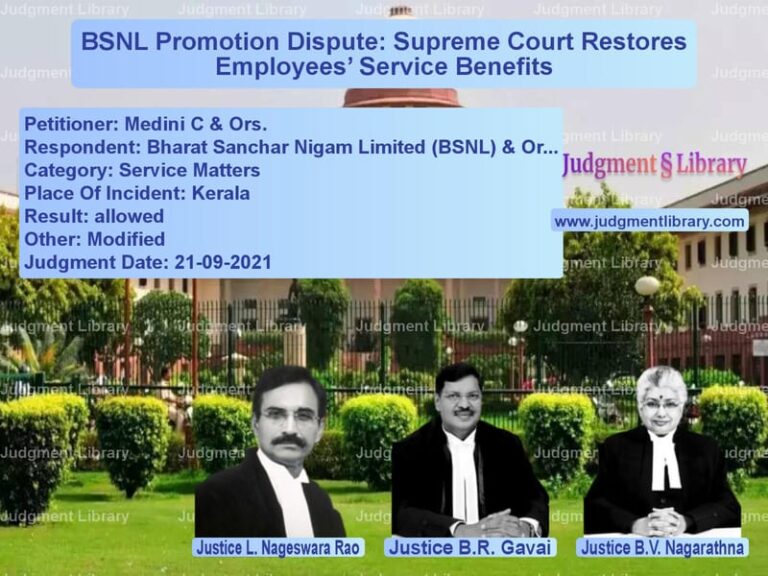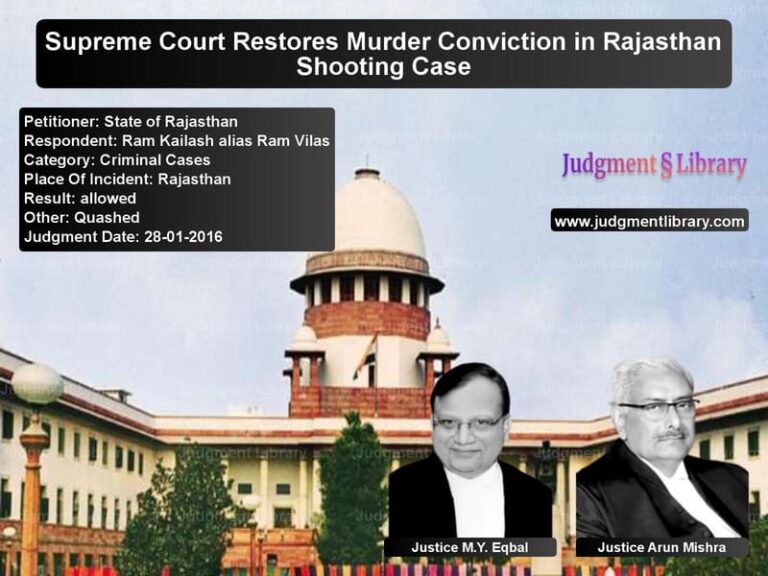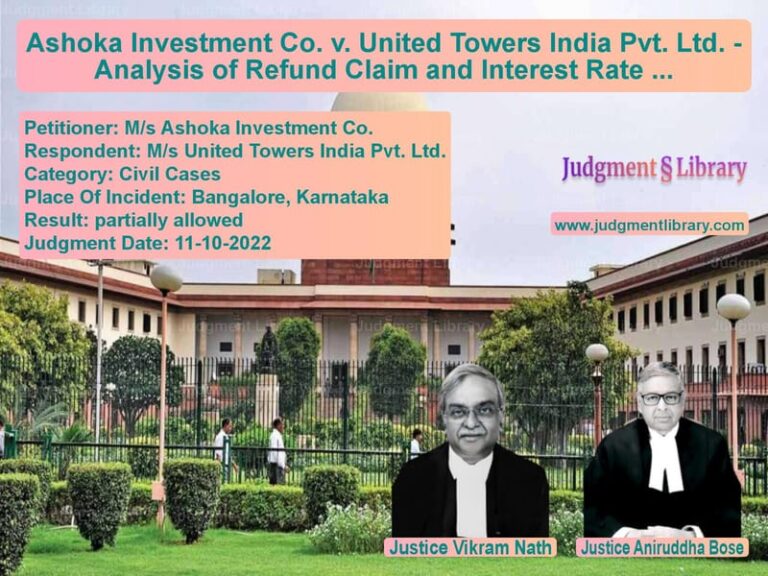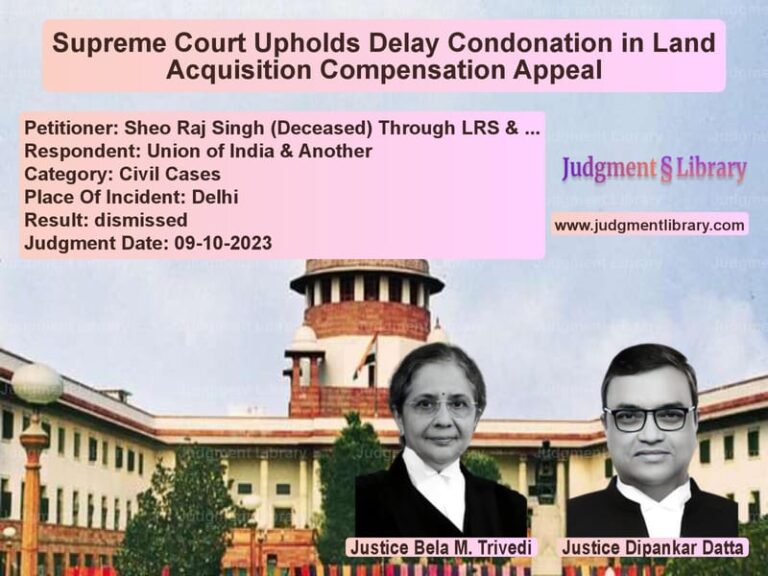Supreme Court Upholds Trial Court’s Decision in Property Gift Deed Dispute
The case of Keshav and Others v. Gian Chand and Another pertains to a legal battle over a disputed gift deed of land. The Supreme Court ruled in favor of Keshav and others, setting aside the judgment of the Himachal Pradesh High Court, which had decreed the suit in favor of Gian Chand and Dhanbir. The Court examined whether the gift deed executed by the deceased, Hardei, was valid and legally enforceable.
Background of the Case
The dispute arose over land measuring 13 bighas 8 biswas and 1.17 bighas in Himachal Pradesh, which was owned by Hardei, who died issueless in 1991. The plaintiffs, Gian Chand and Dhanbir, claimed that Hardei had executed a registered gift deed in their favor on December 23, 1985, which was later registered on January 1, 1986. They alleged that Keshav had fraudulently mutated the land in his name, disregarding their rightful ownership.
They sought the following reliefs:
- A declaration that they were the rightful owners of the land based on the gift deed.
- A permanent injunction restraining Keshav from interfering in their possession.
- Possession of the land in case they were found to have been dispossessed.
Arguments of the Appellants (Keshav and Others)
- The appellants argued that the gift deed relied upon by the plaintiffs was fabricated.
- They contended that Hardei had never executed the gift deed and had, in fact, opposed its mutation in 1989 before the revenue authorities.
- Keshav had been in continuous possession of the land for 15 years as an occupancy tenant, which was admitted by Hardei before her death.
- The plaintiffs never sought to enforce their alleged ownership rights during the lifetime of Hardei, casting doubts on the authenticity of the gift deed.
- The plaintiffs did not take steps to mutate the land from 1986 to 1989, despite their claims of ownership.
Arguments of the Respondents (Gian Chand and Dhanbir)
- The respondents argued that the gift deed was a registered document and satisfied the legal requirements under Sections 122 and 123 of the Transfer of Property Act, 1882.
- They presented witnesses, including Devia (PW-4), an attesting witness, and Ratan Chand (PW-3), who was present during the registration.
- The delay in mutation was due to administrative issues and should not affect the validity of the gift deed.
- The trial court erred in disregarding a legally registered document.
Key Observations of the Supreme Court
1. Authenticity of the Gift Deed
The Supreme Court noted inconsistencies in the execution of the gift deed and observed:
“The plaintiffs did not take any steps for the mutation of the land in their favor until 1989, when it was rejected based on the objections of the donor, Hardei.”
2. Possession and Conduct of the Parties
The Court emphasized the importance of possession and conduct in determining the legitimacy of the claims:
“Keshav had been cultivating the land and taking care of Hardei for 15 years. There was no reason for her to execute a gift deed in favor of the plaintiffs while Keshav was looking after her needs.”
3. Rejection of Mutation Application
The Court placed significant reliance on the revenue records, which showed that Hardei had explicitly denied executing any gift deed:
“When the plaintiffs applied for mutation in 1989, the application was rejected based on the clear statement of the donor, which cannot be ignored.”
4. High Court’s Erroneous Approach
The Supreme Court found that the High Court had overruled the concurrent findings of the trial court and the appellate court without proper justification:
“The High Court erred in disregarding the findings of fact recorded by the lower courts, which had based their decision on well-reasoned analysis.”
5. Burden of Proof in Gift Deeds
The Court reaffirmed that the burden of proving the voluntary execution of a gift deed lies with the party asserting it:
“The plaintiffs failed to establish that the gift deed was executed voluntarily and without undue influence. Given that the donor was an elderly and illiterate woman, the claim required stronger evidence.”
Final Judgment
The Supreme Court allowed the appeal and ruled as follows:
- The High Court’s judgment dated August 8, 2018, is set aside.
- The concurrent findings of the trial court and the first appellate court, which had dismissed the suit, are restored.
- The respondents’ claim of ownership based on the gift deed is rejected.
- Keshav and others are confirmed as the rightful possessors of the land.
Significance of the Judgment
This ruling establishes key legal principles regarding property disputes:
- Registered documents are not absolute proof of ownership. Courts must examine surrounding circumstances and conduct of parties.
- Possession matters in land disputes. If a person has been in long-standing possession, it strengthens their claim.
- Mutation records are critical. If the original landowner objected to a transfer during their lifetime, courts will scrutinize the claim more rigorously.
- Burden of proof is on the claimant. The person relying on a gift deed must establish its voluntary and genuine execution.
This judgment reinforces that courts must thoroughly examine the validity of claims involving elderly landowners and registered documents before making a final decision.
Petitioner Name: Keshav and Others.Respondent Name: Gian Chand and Another.Judgment By: Justice M.R. Shah, Justice Sanjiv Khanna.Place Of Incident: Himachal Pradesh, India.Judgment Date: 24-01-2022.
Don’t miss out on the full details! Download the complete judgment in PDF format below and gain valuable insights instantly!
Download Judgment: keshav-and-others-vs-gian-chand-and-anoth-supreme-court-of-india-judgment-dated-24-01-2022.pdf
Directly Download Judgment: Directly download this Judgment
See all petitions in Property Disputes
See all petitions in Succession and Wills
See all petitions in Landlord-Tenant Disputes
See all petitions in Judgment by Mukeshkumar Rasikbhai Shah
See all petitions in Judgment by Sanjiv Khanna
See all petitions in allowed
See all petitions in Quashed
See all petitions in supreme court of India judgments January 2022
See all petitions in 2022 judgments
See all posts in Civil Cases Category
See all allowed petitions in Civil Cases Category
See all Dismissed petitions in Civil Cases Category
See all partially allowed petitions in Civil Cases Category







